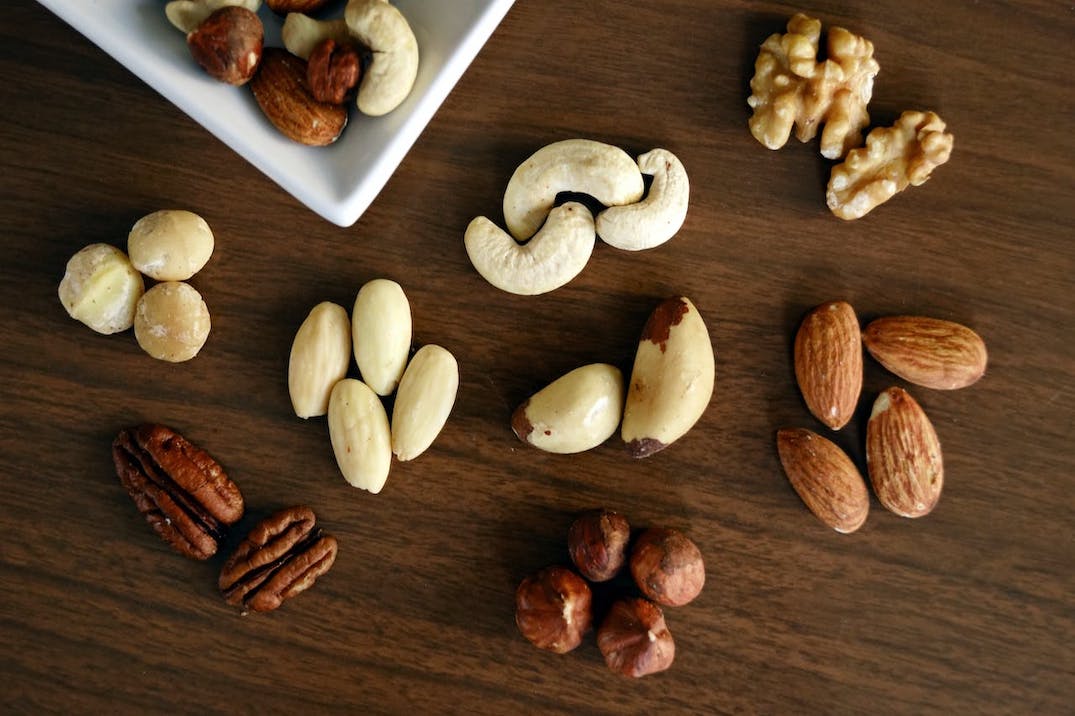Can a Nutritionist or Dietitian Help Me Lose Weight?
If you have never achieved your weight loss goal and you feel like you have tried everything under the sun, you may want to seek professional help from a nutritionist or dietitian. A well-trained nutritionist can build a custom nutrition plan that fits your personal needs and lifestyle that you can stick to long-term.
Dietitians and nutritionists can help people lose weight in a way that is healthy, sustainable, and more enjoyable than following a fad diet. During your weight loss journey, they can teach you how to craft your own meal plan, how to make smart decisions while shopping and dining out, and how to keep the weight off.
If you have struggled with losing weight in the past, you may want to consider getting help from a nutrition expert to find out what works best for you. This guide goes over how nutritionists and dietitians can help you lose weight.
If you’re interested in booking a dietitian visit, you can do so through us here at Zaya Care. 90% of our patients pay $0 for appointments since our providers accept over 100 insurance plans such as Aetna, United Healthcare, Empire BlueCross BlueShield, and many more.
Nutritionist vs. dietitian for losing weight: what’s the difference & which is better?
The term nutritionist is a more general term for professionals who help people improve their health through nutrition. Nutritionists include dietitians, however, not everyone who refers to themself as a nutritionist is a Registered Dietitian (RD).
While nutritionists and dietitians may appear to be the same, there are big differences when it comes to education, training, licensure requirements, and certifications. The requirements to become a dietitian include a 4-year bachelor’s degree, 1,200 hours of supervised practice, and passing the national registered dietitian exam.
While a nutritionist may have some sort of education and training, there are no mandatory requirements to become a nutritionist. Both can help with weight loss, but a dietitian has more training and requirements to earn their credentials, so you might be better off going with a dietitian if you want to get the most out of your experience.

Reach your weight loss goals faster with support from a Registered Dietitian
90% of Zaya Care patients pay $0 for dietitian visits
How a nutritionist or dietitian can help you lose weight
It can be difficult to sift through all of the diet and nutrition information that is out there. Getting personal and professional advice from a nutritionist or dietitian is almost always worth it as can help bring clarity to your nutrition needs and the best weight loss strategy for you.
1) Craft a healthy meal plan that fits your personal needs & preferences
Long-term, healthy weight loss requires much more than a fad diet or strict meal plan. A weight loss dietitian will get to know your specific nutrition needs based on your health status and will consider your personal preferences to build a meal plan that fits you and your lifestyle.
This will also help you understand portion sizes so that you can plan healthy meals on your own which will get you closer to your goals. For example, one thing many people struggle with is how much fat to eat to lose weight. Your dietitian can help with this along with anything else related to your nutrition.
Having a flexible, personalized meal plan will make your journey much more enjoyable and help you keep the weight off for good.
>> Read more: How to meal prep for weight loss
2) Help you learn to read food labels & make smart choices
With all of the food products on the market, trying to pick out the healthiest options can be overwhelming. Your dietitian can educate you on how to read a food label. This will include ingredients that you can look for to indicate how healthy a food product really is.
That way, you won’t be deceived by product names or words on packages that make foods sound healthy. Having proper knowledge about food labels and healthy choices will help you feel more confident in your decision-making and become a smarter grocery shopper.
3) Provide guidance for dining out
Dining out and eating or drinking at social functions is a normal part of life. If you’re trying to lose weight, these situations may make you feel like they will hinder your progress. However, this does not have to be the case with proper planning.
Your dietitian or nutritionist can help you come up with a practical plan that helps you enjoy the moment while staying on track. They can teach you how to navigate a restaurant menu, how to eat mindfully, and how to find a balance between choosing healthy options and treating yourself.
4) Go over mindful eating strategies
There are lots of nutrition strategies people can utilize to lose weight. Some people find calorie and macro tracking to be helpful, while others find this difficult and not realistic to do in their everyday lives. That is why your nutritionist can teach you mindful eating strategies that will promote healthy weight loss.
Mindful eating will help you learn how to nourish your body properly while still eating foods you enjoy in amounts that feel good. This will help you be more mindful of your hunger and fullness, eliminate distractions while eating, and enjoy the healthy foods that you choose. Practicing mindful eating on your weight loss journey can help you achieve long-term success.
>> Read More: Hungry After Eating? Possible Reasons Why
5) Make sure you lose weight at a healthy rate for long-term weight loss
In our society today, people like to seek quick fixes and the fastest results. The reality is, if you lose too much weight too quickly, you risk negative consequences like fatigue and losing lean muscle. Oftentimes, people who lose weight quickly from a diet end up gaining weight back once they’re done dieting.
Your dietitian will guide you in following a healthy eating pattern that promotes gradual, long-term weight loss. You may not lose weight as quickly, but you will more likely keep it off for good and feel much better during the process.
6) Help you understand how to fuel your body properly for workouts
Exercise is an important part of losing weight. In order to get the most out of your workouts, you need to have an adequate amount of energy to push through. You also need a good post-workout routine with your nutrition to help you recover.
By working with a dietitian or nutritionist, you will learn what some of the best foods are to eat before a workout and what you should eat after to feel your best during your workouts, build and maintain lean body mass, and support a successful weight loss routine.
7) Provide accountability & motivation
Losing weight in a sustainable, healthy way can take time. Most of us can benefit from having accountability when we are adopting healthy habits. A nutrition professional can provide you with the positive support you need to stay on track with your weight loss goals.
It’s easy to find motivation when we first start out, but over time, it often fades. Your dietitian or nutritionist is there to remind you of your long-term goal and why it is important to you. This may be just what you need to stay motivated and keep going, even on your hard days.
8) Help you break through plateaus & make adjustments as needed
If you have been trying to lose weight for a long period of time, it is not uncommon for you to reach a plateau.
This is where it seems like your weight does not budge no matter what you do or how hard you try. A nutrition expert can assess where you are at, what your current diet habits are, and what the best next step is to break your plateau.
9) Help with health issues
Most of us know that being overweight can put people at risk for certain health issues, such as high blood pressure and type 2 diabetes.
No matter what your health condition is, your dietitian will guide you into choosing the best foods and portions to manage your condition and prevent symptoms.
Along with weight loss, your dietitian can help you make sure you are getting the right nutrients to prevent nutrient deficiencies and promote good health overall. By improving your health, you may feel better and be more motivated to eat well and work out.

Reach your weight loss goals faster with support from a Registered Dietitian
90% of Zaya Care patients pay $0 for dietitian visits
Guidelines for how fast you can lose weight
Many people who want to lose weight often think the quicker the weight loss, the better. However, this is not always the case. In order to avoid negative consequences, weight loss should be gradual and steady.
Losing weight too quickly from overly restrictive diets can lead to consequences like muscle loss, nutrient deficiencies, and fatigue. In addition to an appropriate calorie deficit and exercise routine, consuming enough of the right nutrients is just as important for weight loss and health.
Research shows that people who lose about one to two pounds a week are more likely to keep that weight off compared to people who lose weight at a quicker rate. This is typically because the diet pattern they follow is personalized and more sustainable.
What to expect in your appointments with a dietitian or nutritionist
If you have never met with a dietitian before, it is helpful to know what to expect before your first appointment. Some people think they will be judged on what they eat or told that they can never have their favorite foods again. However, you can expect your dietitian to listen, educate, support, and motivate you to adopt healthy nutrition habits and achieve your goals.
Initial appointment
During your first appointment, your dietitian will ask several questions to get a clear understanding of your health history, food habits, and current nutrition needs. You can also ask any questions you have for your dietitian that may help them tailor your care and make sure your concerns are addressed.
This appointment typically lasts 45 minutes to one hour. The goal is to gather enough information to provide you with the best food recommendations for you.
You and your dietitian will also discuss your long-term and short-term goals. By the end of your first appointment, you should have a clear plan of action for how you are going to achieve each goal. This may even include a meal plan to follow, depending on the dietitian you work with.
Because developing life-long nutrition habits can take time, your dietitian will most likely schedule a follow-up appointment. The number of times you need to see your dietitian will depend on your situation, which your dietitian will discuss with you.
Follow-up appointment
During your first follow-up appointment, you and your dietitian will discuss how well you were able to implement your nutrition plan. Your dietitian will assess your progress with your goals and any other progress you made, such as weight loss, weight gain, improvements in blood sugar, or improvements in gastrointestinal symptoms.
If you face specific challenges that prevent you from achieving your goals, your dietitian may provide you with additional resources to help you through those challenges. Your dietitian may also make changes to your plan if necessary or add more goals to keep you progressing toward your long-term goal.
How Zaya Care helps you book registered dietitians covered by your insurance
Here at Zaya Care, we’re dedicated to helping people find the care they need based on their preferences, needs, and insurance.
When you request an appointment with one of our Registered Dietitians, we’ll check your insurance so you know exactly how much you’ll have to pay, if anything at all.
We’ll use the information you provide to run an eligibility check with your provider and let you know how much of your dietitian visit your insurance will cover and what you might have to pay yourself.
It’s worth noting that 90% of Zaya Care patients pay $0 for nutrition care with a registered dietitian as we are in-network with many major carriers.

Reach your weight loss goals faster with support from a Registered Dietitian
90% of Zaya Care patients pay $0 for dietitian visits
If you have never achieved your weight loss goal and you feel like you have tried everything under the sun, you may want to seek professional help from a nutritionist or dietitian. A well-trained nutritionist can build a custom nutrition plan that fits your personal needs and lifestyle that you can stick to long-term.
Dietitians and nutritionists can help people lose weight in a way that is healthy, sustainable, and more enjoyable than following a fad diet. During your weight loss journey, they can teach you how to craft your own meal plan, how to make smart decisions while shopping and dining out, and how to keep the weight off.
If you have struggled with losing weight in the past, you may want to consider getting help from a nutrition expert to find out what works best for you. This guide goes over how nutritionists and dietitians can help you lose weight.
If you’re interested in booking a dietitian visit, you can do so through us here at Zaya Care. 90% of our patients pay $0 for appointments since our providers accept over 100 insurance plans such as Aetna, United Healthcare, Empire BlueCross BlueShield, and many more.
Nutritionist vs. dietitian for losing weight: what’s the difference & which is better?
The term nutritionist is a more general term for professionals who help people improve their health through nutrition. Nutritionists include dietitians, however, not everyone who refers to themself as a nutritionist is a Registered Dietitian (RD).
While nutritionists and dietitians may appear to be the same, there are big differences when it comes to education, training, licensure requirements, and certifications. The requirements to become a dietitian include a 4-year bachelor’s degree, 1,200 hours of supervised practice, and passing the national registered dietitian exam.
While a nutritionist may have some sort of education and training, there are no mandatory requirements to become a nutritionist. Both can help with weight loss, but a dietitian has more training and requirements to earn their credentials, so you might be better off going with a dietitian if you want to get the most out of your experience.

Reach your weight loss goals faster with support from a Registered Dietitian
90% of Zaya Care patients pay $0 for dietitian visits
How a nutritionist or dietitian can help you lose weight
It can be difficult to sift through all of the diet and nutrition information that is out there. Getting personal and professional advice from a nutritionist or dietitian is almost always worth it as can help bring clarity to your nutrition needs and the best weight loss strategy for you.
1) Craft a healthy meal plan that fits your personal needs & preferences
Long-term, healthy weight loss requires much more than a fad diet or strict meal plan. A weight loss dietitian will get to know your specific nutrition needs based on your health status and will consider your personal preferences to build a meal plan that fits you and your lifestyle.
This will also help you understand portion sizes so that you can plan healthy meals on your own which will get you closer to your goals. For example, one thing many people struggle with is how much fat to eat to lose weight. Your dietitian can help with this along with anything else related to your nutrition.
Having a flexible, personalized meal plan will make your journey much more enjoyable and help you keep the weight off for good.
>> Read more: How to meal prep for weight loss
2) Help you learn to read food labels & make smart choices
With all of the food products on the market, trying to pick out the healthiest options can be overwhelming. Your dietitian can educate you on how to read a food label. This will include ingredients that you can look for to indicate how healthy a food product really is.
That way, you won’t be deceived by product names or words on packages that make foods sound healthy. Having proper knowledge about food labels and healthy choices will help you feel more confident in your decision-making and become a smarter grocery shopper.
3) Provide guidance for dining out
Dining out and eating or drinking at social functions is a normal part of life. If you’re trying to lose weight, these situations may make you feel like they will hinder your progress. However, this does not have to be the case with proper planning.
Your dietitian or nutritionist can help you come up with a practical plan that helps you enjoy the moment while staying on track. They can teach you how to navigate a restaurant menu, how to eat mindfully, and how to find a balance between choosing healthy options and treating yourself.
4) Go over mindful eating strategies
There are lots of nutrition strategies people can utilize to lose weight. Some people find calorie and macro tracking to be helpful, while others find this difficult and not realistic to do in their everyday lives. That is why your nutritionist can teach you mindful eating strategies that will promote healthy weight loss.
Mindful eating will help you learn how to nourish your body properly while still eating foods you enjoy in amounts that feel good. This will help you be more mindful of your hunger and fullness, eliminate distractions while eating, and enjoy the healthy foods that you choose. Practicing mindful eating on your weight loss journey can help you achieve long-term success.
>> Read More: Hungry After Eating? Possible Reasons Why
5) Make sure you lose weight at a healthy rate for long-term weight loss
In our society today, people like to seek quick fixes and the fastest results. The reality is, if you lose too much weight too quickly, you risk negative consequences like fatigue and losing lean muscle. Oftentimes, people who lose weight quickly from a diet end up gaining weight back once they’re done dieting.
Your dietitian will guide you in following a healthy eating pattern that promotes gradual, long-term weight loss. You may not lose weight as quickly, but you will more likely keep it off for good and feel much better during the process.
6) Help you understand how to fuel your body properly for workouts
Exercise is an important part of losing weight. In order to get the most out of your workouts, you need to have an adequate amount of energy to push through. You also need a good post-workout routine with your nutrition to help you recover.
By working with a dietitian or nutritionist, you will learn what some of the best foods are to eat before a workout and what you should eat after to feel your best during your workouts, build and maintain lean body mass, and support a successful weight loss routine.
7) Provide accountability & motivation
Losing weight in a sustainable, healthy way can take time. Most of us can benefit from having accountability when we are adopting healthy habits. A nutrition professional can provide you with the positive support you need to stay on track with your weight loss goals.
It’s easy to find motivation when we first start out, but over time, it often fades. Your dietitian or nutritionist is there to remind you of your long-term goal and why it is important to you. This may be just what you need to stay motivated and keep going, even on your hard days.
8) Help you break through plateaus & make adjustments as needed
If you have been trying to lose weight for a long period of time, it is not uncommon for you to reach a plateau.
This is where it seems like your weight does not budge no matter what you do or how hard you try. A nutrition expert can assess where you are at, what your current diet habits are, and what the best next step is to break your plateau.
9) Help with health issues
Most of us know that being overweight can put people at risk for certain health issues, such as high blood pressure and type 2 diabetes.
No matter what your health condition is, your dietitian will guide you into choosing the best foods and portions to manage your condition and prevent symptoms.
Along with weight loss, your dietitian can help you make sure you are getting the right nutrients to prevent nutrient deficiencies and promote good health overall. By improving your health, you may feel better and be more motivated to eat well and work out.

Reach your weight loss goals faster with support from a Registered Dietitian
90% of Zaya Care patients pay $0 for dietitian visits
Guidelines for how fast you can lose weight
Many people who want to lose weight often think the quicker the weight loss, the better. However, this is not always the case. In order to avoid negative consequences, weight loss should be gradual and steady.
Losing weight too quickly from overly restrictive diets can lead to consequences like muscle loss, nutrient deficiencies, and fatigue. In addition to an appropriate calorie deficit and exercise routine, consuming enough of the right nutrients is just as important for weight loss and health.
Research shows that people who lose about one to two pounds a week are more likely to keep that weight off compared to people who lose weight at a quicker rate. This is typically because the diet pattern they follow is personalized and more sustainable.
What to expect in your appointments with a dietitian or nutritionist
If you have never met with a dietitian before, it is helpful to know what to expect before your first appointment. Some people think they will be judged on what they eat or told that they can never have their favorite foods again. However, you can expect your dietitian to listen, educate, support, and motivate you to adopt healthy nutrition habits and achieve your goals.
Initial appointment
During your first appointment, your dietitian will ask several questions to get a clear understanding of your health history, food habits, and current nutrition needs. You can also ask any questions you have for your dietitian that may help them tailor your care and make sure your concerns are addressed.
This appointment typically lasts 45 minutes to one hour. The goal is to gather enough information to provide you with the best food recommendations for you.
You and your dietitian will also discuss your long-term and short-term goals. By the end of your first appointment, you should have a clear plan of action for how you are going to achieve each goal. This may even include a meal plan to follow, depending on the dietitian you work with.
Because developing life-long nutrition habits can take time, your dietitian will most likely schedule a follow-up appointment. The number of times you need to see your dietitian will depend on your situation, which your dietitian will discuss with you.
Follow-up appointment
During your first follow-up appointment, you and your dietitian will discuss how well you were able to implement your nutrition plan. Your dietitian will assess your progress with your goals and any other progress you made, such as weight loss, weight gain, improvements in blood sugar, or improvements in gastrointestinal symptoms.
If you face specific challenges that prevent you from achieving your goals, your dietitian may provide you with additional resources to help you through those challenges. Your dietitian may also make changes to your plan if necessary or add more goals to keep you progressing toward your long-term goal.
How Zaya Care helps you book registered dietitians covered by your insurance
Here at Zaya Care, we’re dedicated to helping people find the care they need based on their preferences, needs, and insurance.
When you request an appointment with one of our Registered Dietitians, we’ll check your insurance so you know exactly how much you’ll have to pay, if anything at all.
We’ll use the information you provide to run an eligibility check with your provider and let you know how much of your dietitian visit your insurance will cover and what you might have to pay yourself.
It’s worth noting that 90% of Zaya Care patients pay $0 for nutrition care with a registered dietitian as we are in-network with many major carriers.

Reach your weight loss goals faster with support from a Registered Dietitian
90% of Zaya Care patients pay $0 for dietitian visits
















